Another series of riots in peripheral Europe.
Europe is centered about Denmark?
http://krugman.blogs.nytimes.com/2012/09/26/euro-update-the-perils-of-pointless-pain/
Euro Update: The Perils of Pointless Pain
So,
I’m in jet lag city, which means that it’s time for a euro update.
(I’ve been pretty focused on the US election, since it is, after all, my
country; but still keeping an eye on the other side of the pond).
The basic story of the euro crisis remains the same: it’s essentially a balance of payments crisis, misinterpreted as a fiscal crisis, and the key question is whether internal devaluation is really workable.
What? OK: the roots of the euro crisis lie not in government profligacy but in huge capital flows from the core (mainly Germany) to the periphery during the good years. These capital flows fueled a peripheral boom, and sharply rising wages and prices in the GIPSI countries relative to Germany:
 Then the music stopped.
Then the music stopped.
The combination of deeply depressed peripheral economies (which meant surging budget deficits) and fears of a euro crackup turned this into an attack on peripheral-government bonds. But the root remains the balance of payments/cost problem. And any resolution must involve getting costs and prices back in line.
This is the context in which you have to see Mario Draghi’s actions. Twice now — first with the LTRO last fall, then with the plan to buy sovereign debt, he has stepped in to limit runaway bond yields, short-circuiting a possible financial “death spiral” of falling bond prices, collapsing banks, and high-speed capital flight. Here are bond yields (monthly averages, with the most recent data standing in for September):
 Good
for him. But you still need “internal devaluation”: a sharp fall in
costs and prices relative to the core. And that’s a slow, painful
process.
Good
for him. But you still need “internal devaluation”: a sharp fall in
costs and prices relative to the core. And that’s a slow, painful
process.
Where does austerity fit in to this story? Mostly it doesn’t. Shaving an extra couple of points off the structural deficit will make very little difference to long-run solvency, nor will it do much to accelerate the pace of internal devaluation. It will, however, depress employment even further and inflict a lot of direct suffering too through cuts in social programs.
Why do it, then? Partly it’s because Europe is still operating on the false theory that this is essentially a fiscal issue; partly it’s to assuage the Germans, who remain convinced that those lazy Southern Europeans are getting away with something. In effect, the policy is to inflict pain for the sake of inflicting pain.
Which brings us to the question: can this go on? When do the people of the afflicted economies say that they can bear no more?
The news from Spain, with vast protests and talk of secession, suggests that this moment may be approaching fast. Also, while Greece has long since ceased to be the epicenter, things seem to be breaking down there too.
I really do think Draghi has done very well. But he can’t make internal devaluation work on his own, and he can’t save Europe if its leaders continue to think that gratuitous infliction of pain is sound policy."
The basic story of the euro crisis remains the same: it’s essentially a balance of payments crisis, misinterpreted as a fiscal crisis, and the key question is whether internal devaluation is really workable.
What? OK: the roots of the euro crisis lie not in government profligacy but in huge capital flows from the core (mainly Germany) to the periphery during the good years. These capital flows fueled a peripheral boom, and sharply rising wages and prices in the GIPSI countries relative to Germany:

The combination of deeply depressed peripheral economies (which meant surging budget deficits) and fears of a euro crackup turned this into an attack on peripheral-government bonds. But the root remains the balance of payments/cost problem. And any resolution must involve getting costs and prices back in line.
This is the context in which you have to see Mario Draghi’s actions. Twice now — first with the LTRO last fall, then with the plan to buy sovereign debt, he has stepped in to limit runaway bond yields, short-circuiting a possible financial “death spiral” of falling bond prices, collapsing banks, and high-speed capital flight. Here are bond yields (monthly averages, with the most recent data standing in for September):

Where does austerity fit in to this story? Mostly it doesn’t. Shaving an extra couple of points off the structural deficit will make very little difference to long-run solvency, nor will it do much to accelerate the pace of internal devaluation. It will, however, depress employment even further and inflict a lot of direct suffering too through cuts in social programs.
Why do it, then? Partly it’s because Europe is still operating on the false theory that this is essentially a fiscal issue; partly it’s to assuage the Germans, who remain convinced that those lazy Southern Europeans are getting away with something. In effect, the policy is to inflict pain for the sake of inflicting pain.
Which brings us to the question: can this go on? When do the people of the afflicted economies say that they can bear no more?
The news from Spain, with vast protests and talk of secession, suggests that this moment may be approaching fast. Also, while Greece has long since ceased to be the epicenter, things seem to be breaking down there too.
I really do think Draghi has done very well. But he can’t make internal devaluation work on his own, and he can’t save Europe if its leaders continue to think that gratuitous infliction of pain is sound policy."
The Telegraph:
Spain's crisis flares again as AAA club scuppers bank rescue deal
Spain's debt crisis has returned with a vengeance after Germany, Holland and Finland reneged on a crucial summit deal and scuppered hopes of direct eurozone help for Spanish banks.
26 Sep 2012
| 48 Comments
Not even the great economists of history can get us out of this fix
The route back to economic health will be painful, costly and long, believes Jeremy Warner
26 Sep 2012
| 114 Comments
ECB will not fill Greek budget gaps, says Bundesbank president
The European Central Bank will not fill potential financing gaps in Greece's budget, Governing Council member Jens Weidmann said on Wednesday.
26 Sep 2012
| 4 Comments
Spain GDP falls at 'significant pace'
Spain's recession is deepening with economic output sliding at a "significant pace" in the third quarter of this year, the Bank of Spain warned on Wednesday.
26 Sep 2012
| 13 Comments
Jeremy Warner wants the revolution.
The Guardian:
-
26 Sep 2012: Editorial: This is a pan-southern-European pushback against austerity happening while the package is still being negotiated
-
26 Sep 2012: Letters: Ainger ends with a reminder that 600,000 Portuguese swarming the gates of parliament and city centres forced their government into a U-turn
-
-
26 Sep 2012: Suzanne Moore: While we allow ourselves to be distracted by Andrew Mitchell's antics and conference season, in Spain and Greece citizens are fighting for control of their destiny
-
26 Sep 2012: General strike brings country to a halt in first confrontation with three-month-old government
-
-
26 Sep 2012: Economic figures from France, Italy and Spain mixed with civil unrest and political dithering cause stock exchange turbulence
-
-
-
26 Sep 2012: Anti-austerity walkout called by unions expected to ground flights, disrupt local transport and shut public service offices
-
-
-
25 Sep 2012: Katharine Ainger: Spain's government is right to fear the public reaction to this new round of suffering mandated by the financial markets
Opiate salesmen.
Times:
Protesters Take to Street in Madrid
section A - page 4
http://www.nakedcapitalism.com/2012/09/in-europe-its-debt-vs-jobs.htmlWednesday, September 26, 2012
In Europe, It’s Debt vs. Jobs
By
Delusional Economics, who is determined to cleanse the daily flow of
vested interests propaganda to produce a balanced counterpoint. Cross
posted from MacroBusiness.
Lambert here. Yves comments: “A nice explanation of why austerity inEurope
isn’t working (even though the writer is weirdly defensive about saying it in those terms).”
As the signs of social unrest continue to grow in the southern peripheries of Europe, highlighted again by the over night action in Spain, I thought it was timely to take a step back from the day-to-day and re-assess exactly what we are witnessing in the Eurozone from the longer macro-view.
If you’ve been reading my near-daily pontifications about Europe for any length of time you should be aware that I consider the policy approach being taken in the Eurozone to be the makings of a real disaster. I have been accused by some of being anti-austerity but that isn’t my real issue with the policy at all. My major concerns has been that policy targets of internal devaluation and export driven recovery in the absence ofdebt
forgiveness on a near-contintent wide scale will fail because:
a ) the initial outcome will be a rapid decline in industrial production and national incomes which mean existing debts will become unserviceable
b ) external surpluses require a counter-party external deficit
c ) structural adjustments require investment
So basically, the three targeted outcomes for the existing policy a) service existing debts, b) lower government deficits c) become export competitive are incompatible because the expectation that falling internal demand will quickly be replaced export driven production is a form of utopian economic fantasy.
Over the last two years Greece has been held up as a ‘outlier’ for what should occur but the reality is, as Spain and Portugal are now demonstrating, that this outcome is the most likely and, as I have been discussing , completely predictable.
As I mentioned a few weeks ago, Portugal, the poster child of austerity, is failing to meet its targets even though it appeared to be on target over the previous 18 months. What we see in Portugal is a country bouncing off the limits of the current policy.
The basic premise of European policy is to tighten government budgets in an effort to drive down deficits. In the absence of a current account surplus in order to maintain a level of national income this requires an expansion of private sector balance sheets. If this does not occur then the most likely outcome is a slowing of internal demand and therefore a slowing of imports. This in turn should drive the balance of trade towards positive territory, but at the same time lower overall GDP.
Falling GDP leads to falling national income, which in the absence of real across the board wage deflation means more unemployment and therefore slowing government revenues which, as I’ve said previously, leads to a self-defeating process of re-newed cuts to government budgets.
So in essence this whole process becomes a struggle between the balance of the external sector, real wages and unemployment and this is the dynamic we have been witnessing in much of the periphery over the last 18 months. What I have noticed recently is that the adjustments in periphery nations balance of trade has been seen by some as a sign of recovery, which in part it is, but ultimately what is required is a sustained current account surplus.
The counter-weight to these external sector adjustments is on-going social retrenchment that occurs as unemployment rises. This is why the existing debt and lack of currency devaluation are such barriers because without them it is likely to be impossible for struggling nations to reach a current account surplus, especially as they are all trying to enact the same policies all at once.
In short, much of the economic framework that allowed the periphery to get into this situation in the first place is now making it far more difficult for them to get out and it would now appear we are reaching the limits of the social and political systems within these nations to deal with the stresses. Obviously it’s not to much of a stretch to realise this situation could escalate quickly, and I have warned previously that political capital was likely to be tested over the next 12 months as the continuing deterioration in the Eurozone economy frays the remaining goodwill. I see the back-track from the Portuguese government and the growing tension in both Madrid and Catalonia as recent examples of just this.
Below are some corresponding charts of the metrics I have discussed above.
Portugal

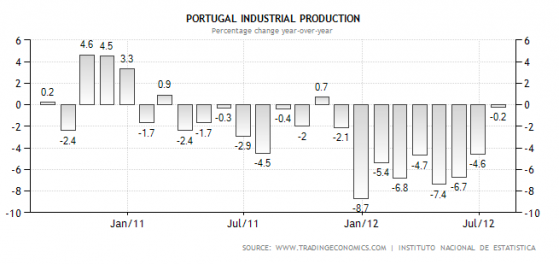
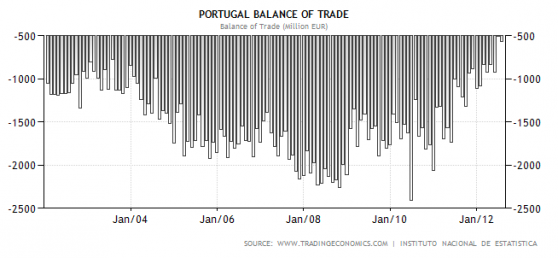
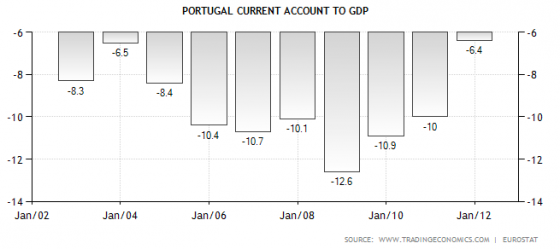
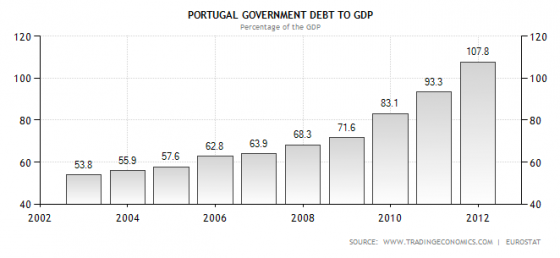
Spain
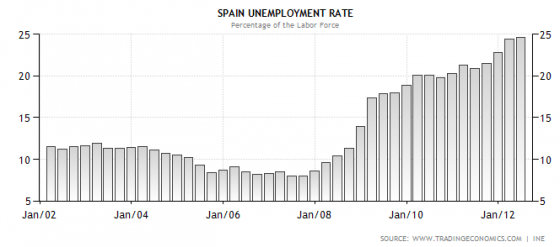

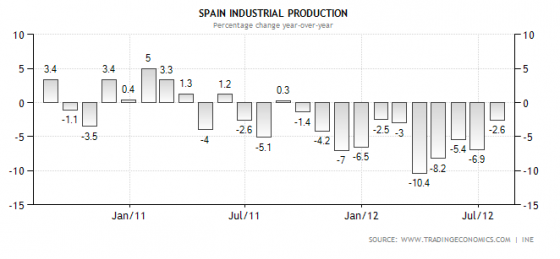

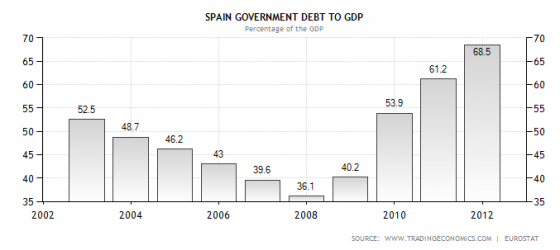
Greece
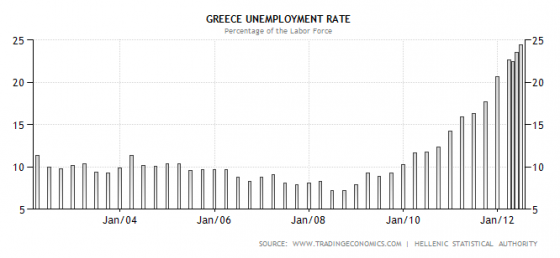
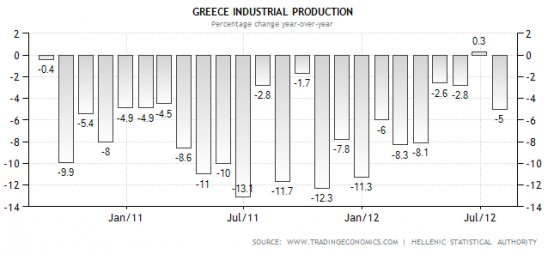
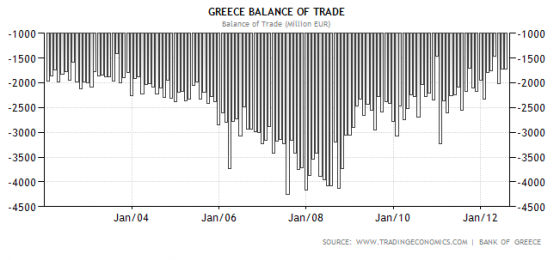
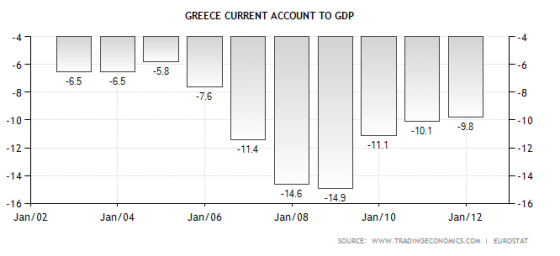
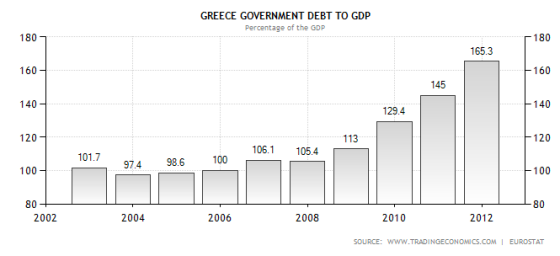
Lambert here. Yves comments: “A nice explanation of why austerity in

As the signs of social unrest continue to grow in the southern peripheries of Europe, highlighted again by the over night action in Spain, I thought it was timely to take a step back from the day-to-day and re-assess exactly what we are witnessing in the Eurozone from the longer macro-view.
If you’ve been reading my near-daily pontifications about Europe for any length of time you should be aware that I consider the policy approach being taken in the Eurozone to be the makings of a real disaster. I have been accused by some of being anti-austerity but that isn’t my real issue with the policy at all. My major concerns has been that policy targets of internal devaluation and export driven recovery in the absence of

a ) the initial outcome will be a rapid decline in industrial production and national incomes which mean existing debts will become unserviceable
b ) external surpluses require a counter-party external deficit
c ) structural adjustments require investment
So basically, the three targeted outcomes for the existing policy a) service existing debts, b) lower government deficits c) become export competitive are incompatible because the expectation that falling internal demand will quickly be replaced export driven production is a form of utopian economic fantasy.
Over the last two years Greece has been held up as a ‘outlier’ for what should occur but the reality is, as Spain and Portugal are now demonstrating, that this outcome is the most likely and, as I have been discussing , completely predictable.
As I mentioned a few weeks ago, Portugal, the poster child of austerity, is failing to meet its targets even though it appeared to be on target over the previous 18 months. What we see in Portugal is a country bouncing off the limits of the current policy.
The basic premise of European policy is to tighten government budgets in an effort to drive down deficits. In the absence of a current account surplus in order to maintain a level of national income this requires an expansion of private sector balance sheets. If this does not occur then the most likely outcome is a slowing of internal demand and therefore a slowing of imports. This in turn should drive the balance of trade towards positive territory, but at the same time lower overall GDP.
Falling GDP leads to falling national income, which in the absence of real across the board wage deflation means more unemployment and therefore slowing government revenues which, as I’ve said previously, leads to a self-defeating process of re-newed cuts to government budgets.
So in essence this whole process becomes a struggle between the balance of the external sector, real wages and unemployment and this is the dynamic we have been witnessing in much of the periphery over the last 18 months. What I have noticed recently is that the adjustments in periphery nations balance of trade has been seen by some as a sign of recovery, which in part it is, but ultimately what is required is a sustained current account surplus.
The counter-weight to these external sector adjustments is on-going social retrenchment that occurs as unemployment rises. This is why the existing debt and lack of currency devaluation are such barriers because without them it is likely to be impossible for struggling nations to reach a current account surplus, especially as they are all trying to enact the same policies all at once.
In short, much of the economic framework that allowed the periphery to get into this situation in the first place is now making it far more difficult for them to get out and it would now appear we are reaching the limits of the social and political systems within these nations to deal with the stresses. Obviously it’s not to much of a stretch to realise this situation could escalate quickly, and I have warned previously that political capital was likely to be tested over the next 12 months as the continuing deterioration in the Eurozone economy frays the remaining goodwill. I see the back-track from the Portuguese government and the growing tension in both Madrid and Catalonia as recent examples of just this.
Below are some corresponding charts of the metrics I have discussed above.
Portugal





Spain





Greece





Obama is up by 4.9% at TPM.
. . .
I hope it is that you are back and not that I have been discovered by the spammers.
I will buy insurance when I have an insurable risk. I do not have that one now.
I will duck the University of Phoenix. There are better correspondence schools.
OK, ten days.
You are listed at match.com?
I will take you to eat anywhere any time. Restaurants earn their money.
Or will be in ten days?
Green coffee bean extract looks overpriced if it is not a complete scam.
Thinner is good but anorexia kills.
I could retire but would rather hang in and max my benefit.
I will not get Lasik.
Spectacles have saved me cataracts, scratched corneas and UV burns.
BBC:
|
|
|
|||||||||||||||||||||||||||||||||||||||||||||||||||||||||||||||||||||||||||||||||||||||||||||||||||||||||||||||||||||||||||||||||||||||||||||||||||||||||||||||||||||||||||||||||||||||||||||||||||||||||||||||||||||||||||||||||||||||||||||||||||||||||||||||||||||||||||||||||||||||
|
|
|
|||||||||||||||||||||||||||||||||||||||||||||||||||||||||||||||||||||||||||||||||||||||||||||||||||||||||||||||||||||||||||||||||||||||||||||||||||||||||||||||||||||||||||||||||||||||||||||||||||||||||||||||||||||||||||||||||||||||||||||||||||||||||||||||||||||||||||||||||||||||
|
Share Prices
|
Summaries: London | NYSE | Nasdaq | Paris | Frankfurt |
|
Search share prices by name or symbol*:
|
|
||||||||
* In London, New York, Paris, Frankfurt and on Nasdaq.
|
|
||||||||
|
|||||||
£
|
$
|
€
|
¥
|
||||
£
|
-
|
||||||
$
|
-
|
||||||
€
|
-
|
||||||
¥
|
-
|
||||||
|
|||||||||
price
|
change
|
%
|
|||||||
| Brent Crude Oil Futures $/barrel | 110.04 |
-0.41
|
-0.4
|
||||||
| West Texas Intermediate Crude Oil Futures $/barrel | 90.19 |
-1.04
|
-1.1
|
||||||
| Forex Gold Index(pm fix) $/oz | 1744.75 |
-26.75
|
-1.5
|
||||||
| Coffee "C" Futures US cents/pound | 169.45 |
-4.20
|
-2.4
|
||||||
| Copper 3mo Unofficial Confirmed $/m tonne | 8106.00 |
-134.00
|
-1.6
|
||||||
Sooner is better. As soon as you can is best.
.












No comments:
Post a Comment